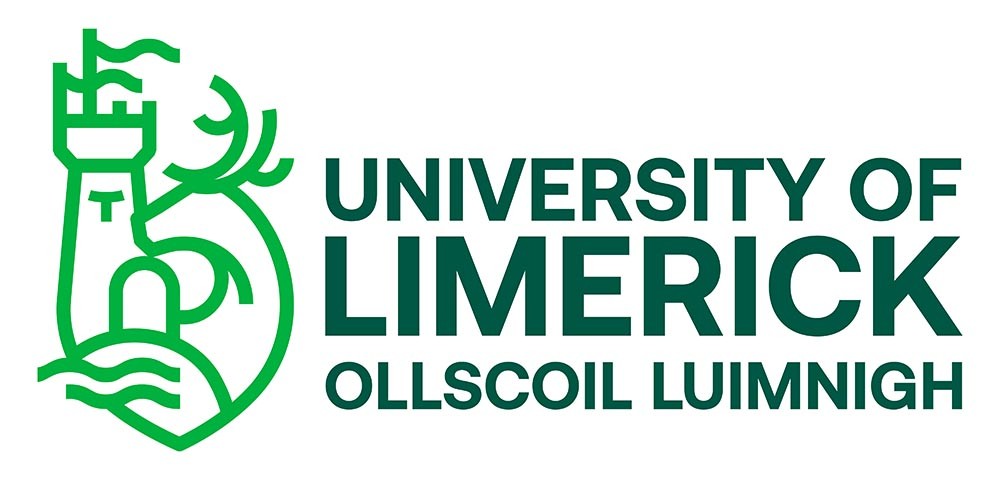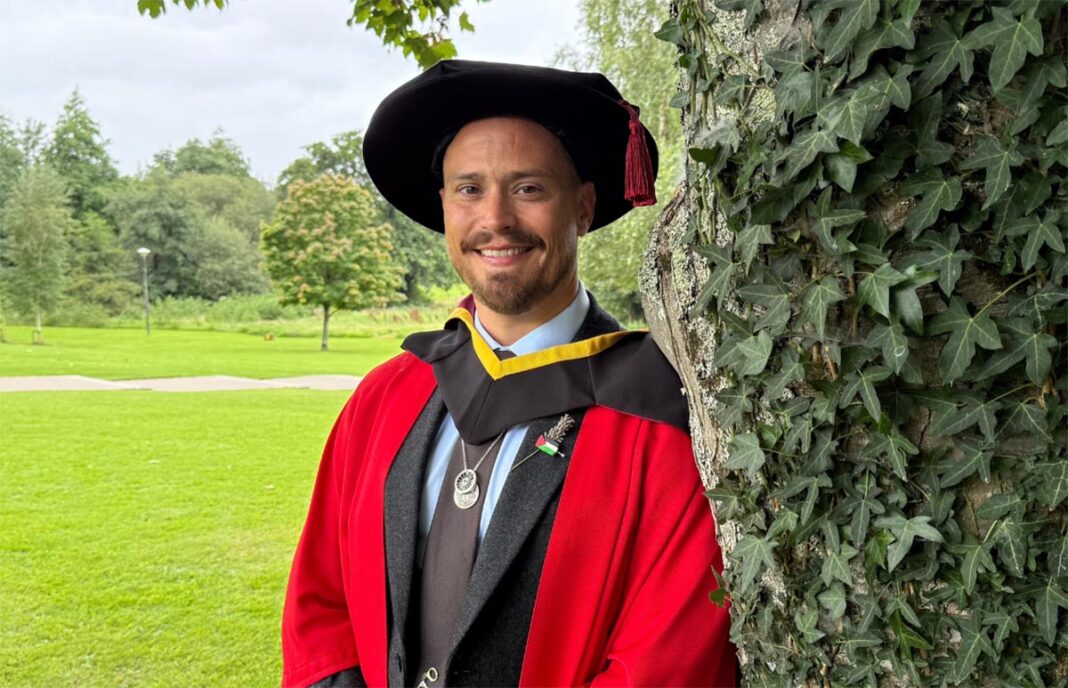A University of Limerick graduate has credited his PhD journey with helping him to fully embrace his Romani identity.
Irish step dancer and harpist, Dr Russell Patrick Brown, who was conferred with a PhD in Arts Practice at UL’s autumn graduation ceremonies, described his research journey as “healing”, “life changing” and “transformative”, which led him to confront his own shame around his Romani identity.
Russell, a native of Cleveland, Ohio, grew up in a household steeped in Irish traditional music and dance and competed in his first Feis at the tender age of five.
He said: “In my dance and throughout my research journey, I often returned to the memory of dancing in the kitchen with my mother and my father waking me up for school every morning playing the Irish tin whistle.”
These seminal moments in his childhood home were to cement a lifelong love of Irish step dance.
While completing his master’s in Irish and Irish-American Studies at New York University, Russell was encouraged by his then professors to pursue a PhD in Arts Practice at UL, a doctoral programme designed to meet the needs of professional performing artists, which combines academic research and creative performance.
Russell was “overjoyed” when the Irish World Academy of Music and Dance at UL accepted him for his PhD studies.
“I felt the research was guiding me to UL. Although my master’s degree was traditionally academic, I kept dancing through what I was discovering and exploring. I felt that the PhD in Arts Practice at the Irish World Academy would really give me the skills to go further into that reflexive process of thinking academically and dancing. It gave me that and so much more than I ever could have imagined.”
Russell’s PhD research at UL centred on impact-driven dance, a term he coined to reflect how he was using dance to confront his traumas and those felt by his Romani ancestors who for centuries have experienced discrimination, violence, cultural suppression and persecution.
He explained: “Traumas, whether they be immediate or distant, have the capacity to break our hearts wide open. As I journeyed through my research and confronted my own traumas through dance, I began to realise that every touch, every stomp on the ground reasserts the right to feel, to exist in the face of discrimination and persecution.
“The impact of anti-Romani racism varies from the painfully loud to the cruelly silent. Dance became for me a kind of exposure therapy – each moment, each movement a chance to confront past traumas.”
When Russell arrived in Ireland to begin his PhD, he was reluctant to reveal his Romani identity due to past experiences of anti-Roma racism in the US. Russell and his family had often hidden their Romani identity to avoid being stigmatised, stereotyped and discriminated against. However, at UL, Russell found a safe space where he could reveal his true self and realised that embracing his Romani heritage was imperative to his research.
He said: “As I got to know my classmates and colleagues at UL, I was inspired by their bravery in speaking up for the marginalised. I also saw the realities of poverty and hardship for the Roma throughout Europe and began more and more to feel like I was being dishonest in my research by not revealing my Romani heritage.
“The final push to own my identity came when I re-read so many 18th and 19th century sources on the history of dance and music in Europe, including Ireland, that mentioned the influence of Romani and Traveller performers and traditions. Suddenly, healing my own shame around my identity became imperative to accurately carrying out my dance history research.”
Russell describes his PhD journey at UL as “transformative” and one which he could not have completed without the ongoing support and encouragement from those in UL, as well as his community in Ennistymon in north Clare – a place he holds dear to his heart, and which inspired his artistic practice.

For Russell, the support of his PhD supervisors, Dr Breandán de Gallaí, a professional Irish dancer, former lead with Riverdance and lecturer at UL’s Irish World Academy, and Dr Catherine Foley, Emeritus Associate Professor at the Irish World Academy, has been instrumental in helping him complete what was to be a 10-year journey.
“I took a professional break and returned to the US during the programme where I worked as a software engineer but when I visited Ireland in 2022, I met with Dr Breandán de Gallaí and he encouraged me to consider returning to finish my PhD. He made the impossible possible and helped me get back into the programme. He believed in me, and none of this work would exist without him.”
Russell speaks fondly of the community in Ennistymon and its environs that embraced him while he carried out his PhD studies at UL.
“In Irish traditional music, Clare is considered holy ground, and this is where my dancing was reborn. I experienced a deep sense of community and fellowship in dance in north Clare. My friends and the community there, and particularly Maria Kerin, an artist and choreographer from Bellharbour, gave me my steps, my neart (energy) and an unexpected sense of healing and homecoming.”
As he celebrates being conferred with his PhD, Russell hopes that his work will not just support future generations of Romani scholars but also help all scholars to realise the value of Romani research, as well as the scholarly work of those from other marginalised communities.
He said: “We deserve to have a seat at the table, and we are needed. How can any of us truthfully study the world we are in if we exclude some of the people in it?”
Reflecting on his research journey, Russell said: “In an age where research that previously would have taken years to generate can be created or destroyed in seconds by technology, the rigor that can come with academic training has never been more important. Arts Practice research really shines in developing the whole artist-scholar in my opinion. It can be tough, but it can also become a powerful foundation for an academic career that is aware of not just what we think, but how we think it.”
For Russell, his PhD journey at UL gave him the structure he needed to work towards being the kind of dancer, academic and person he has always wanted to be.
He concluded: “I am beyond grateful to everyone at UL and the community in north Clare for supporting me through this long journey. I’m so excited for the future and that little voice inside me that felt misunderstood by everyone, including myself, has learned to speak out and now when I dance, I come into a fullness of myself, embodying all the mixed identities I carry inside me. I am whole.”
For more information about Dr Russell Patrick Brown’s work and upcoming performance in Ennistymon on 27 September, visit timedancers.org
